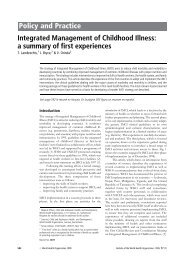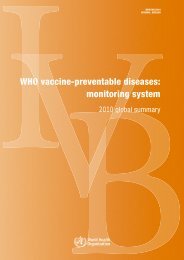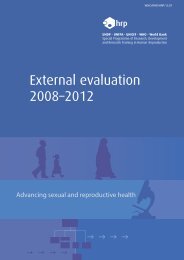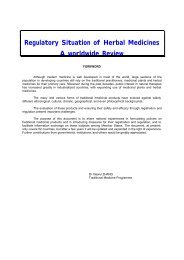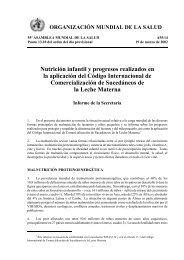IPDE - Extranet Systems - World Health Organization
IPDE - Extranet Systems - World Health Organization
IPDE - Extranet Systems - World Health Organization
You also want an ePaper? Increase the reach of your titles
YUMPU automatically turns print PDFs into web optimized ePapers that Google loves.
53 Experiences with <strong>IPDE</strong><br />
The investigators considered three solutions: (1) to administer the interview<br />
in two sessions; (2) to create separate modules for the ICD-10 and<br />
DSM-III-R PDs; and (3) to screen cases with a questionnaire with a low<br />
rate of false-negatives, thereby eliminating interviews with subjects<br />
unlikely to have a PD diagnosis.<br />
Another question raised by some respondents concerned the duration<br />
of the behaviour used to define PD. ICD-10 and DSM-111-R do not specify<br />
the exact duration of the abnormal behavioural patterns constituting<br />
PDs, but both classifications use the term 'long-term'. ICD-10 states that<br />
the abnormal behaviour 'is stable and of long duration, having its onset<br />
in late childhood or adolescence,' while DSM-III-R says that it is 'characteristic<br />
of the persons's recent (past year) and long-term functioning<br />
(generally since adolescence or early adulthood).' There is some discrepancy<br />
then between ICD-10 and DSM-III-R regarding the onset of<br />
the maladaptive behaviour. The <strong>IPDE</strong> solved these problems by requiring<br />
that the behaviour associated with almost all the diagnostic criteria<br />
be present for at least five years, and at least one of the criteria be evident<br />
before age 25, in order to diagnose that disorder.<br />
Concern was also expressed that a patient might have a disorder like<br />
depression that gives a distorted image of what heishe is usually like. A<br />
patient may also be unaware of some traits or unwilling to acknowledge<br />
them. The influence of depression is a well known problem in the evaluation<br />
of PD by self-report. A previous study with the PDE showed little<br />
influence of anxiety or depression on the categorical or dimensional<br />
assessment of PD.S It may be reasonable to conclude the same for <strong>IPDE</strong><br />
if experienced clinicians carefully question the patients and use their<br />
clinical judgement. Severely depressed patients, however, might have<br />
difficulties in remembering their habitual state due to the effect of<br />
depression. An alternative solution is to postpone the PD examination<br />
until the patient is euthymic m to interview a relative. Lack of awareness<br />
or lying about unfavourable or less socially acceptable behaviour is a<br />
general problem in diagnosing mental disorders, and is not peculiar to<br />
stmcture.d interviews. Although the questions flow naturally, they presume<br />
that the subject is attentive, of normal intelligence, and motivated.<br />
What are specific points with regard to applicability of <strong>IPDE</strong> in your<br />
culture?<br />
Before the study several interviewers were concerned that the <strong>IPDE</strong><br />
might reflect North American attitudes and social and cultural norms









